formerly eScholarship Editions


|
|
|
|
Your request for similar items found 20 book(s). | Modify Search | Displaying 1 - 20 of 20 book(s) | |
| 1. | 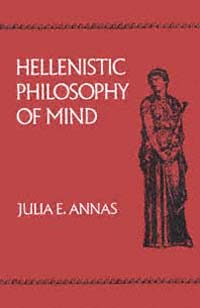 | Title: Hellenistic philosophy of mind Author: Annas, Julia Published: University of California Press, 1994 Subjects: Classics | Social and Political Thought | Intellectual History | Classical Philosophy | Philosophy | Rhetoric Publisher's Description: Hellenistic Philosophy of Mind is an elegant survey of Stoic and Epicurean ideas about the soul - an introduction to two ancient schools whose belief in the soul's physicality offer compelling parallels to modern approaches in the philosophy of mind. Annas incorporates recent thinking on Hellenistic philosophy of mind so lucidly and authoritatively that specialists and nonspecialists alike will find her book rewarding.In part, the Hellenistic epoch was a "scientific" period that broke with tradition in ways that have an affinity with the modern shift from the seventeenth and eighteenth centuries to the present day. Hellenistic philosophy of the soul, Annas argues, is in fact a philosophy of mind, especially in the treatment of such topics as perception, thought, and action. [brief] Similar Items |
| 2. | 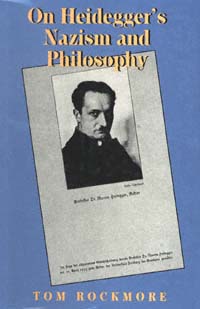 | Title: On Heidegger's Nazism and philosophy Author: Rockmore, Tom 1942- Published: University of California Press, 1991 Subjects: Philosophy | Social and Political Thought | German Studies | Intellectual History Publisher's Description: That Martin Heidegger supported National Socialism has long been common knowledge. Yet the relation between his philosophy and political commitments remains highly contentious and recently has erupted into a vociferous debate. Boldly refuting arguments that the philosopher's political stance was accidental or adopted under coercion, Rockmore argues that Heidegger's philosophical thought and his Nazism are inseparably intertwined, that he turned to National Socialism on the basis of his philosophy, and that his later evolution is largely determined by his continuing concern with Nazism.After developing a framework that clearly outlines the interrelation of Nazism and Heidegger's philosophy, Rockmore analyzes the famous rectoral address the philosopher delivered in 1933 upon becoming rector of the University of Freiburg. In that speech Heidegger sought to ground politics in philosophy. Rockmore examines the inseparable relation of politics and philosophy in Heidegger's Being and Time , the recently published Contributions to Philosophy (written from 1936 to 1938), and the interpretations of Hölderlin, Nietzsche, and technology.In his conclusion Rockmore considers the ongoing discussion of Heidegger's thought and Nazism in France. Combining extensive documentation of the Heidegger controversy with philosophical and historical analysis, this book raises profound questions about the social and political responsibility of philosophy. [brief] Similar Items |
| 3. | 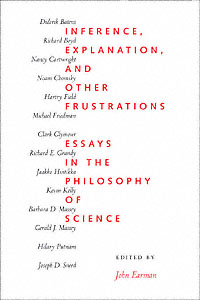 | Title: Inference, explanation, and other frustrations: essays in the philosophy of science Author: Earman, John Published: University of California Press, 1992 Subjects: Philosophy | History and Philosophy of Science Publisher's Description: These provocative essays by leading philosophers of science exemplify and illuminate the contemporary uncertainty and excitement in this changing field. The papers are rich in new perspectives, and their far-reaching criticisms challenge arguments long prevalent in classic philosophical problems of induction, empiricism, and realism. By turns empirical or analytic, historical or programmatic, confessional or argumentative, the authors' arguments both describe and demonstrate the fact that philosophy of science is in a ferment more intense than at any time since the heyday of logical positivism seventy years ago. [brief] Similar Items |
| 4. | 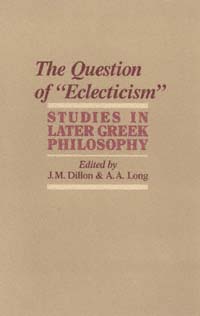 | Title: The Question of "eclecticism": studies in later Greek philosophy Author: Dillon, John M Published: University of California Press, 1988 Subjects: Classics | Classical Philosophy | Social and Political Thought Publisher's Description: This collection of essays is addressed to the growing number of philosophers, classicists, and intellectual historians who are interested in the development of Greek thought after Aristotle. In nine original studies, the authors explore the meaning and history of "eclecticism" in the context of ancient philosophy. The book casts fresh light on the methodology of such central figures as Cicero, Philo, Plutarch, Sextus Empiricus, and Ptolemy, and also illuminates many of the conceptual issues discussed most creatively in this period. [brief] Similar Items |
| 5. | 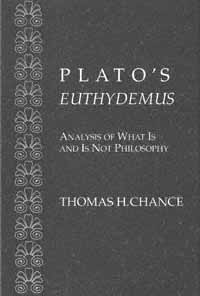 | Title: Plato's Euthydemus: analysis of what is and is not philosophy Author: Chance, Thomas H Published: University of California Press, 1992 Subjects: Philosophy | Social and Political Thought | Classical Philosophy | Literature Publisher's Description: With Plato's Euthydemus , Thomas Chance solves a longstanding riddle of Platonic studies. Thought to be an early, immature work, the Euthydemus has come across to scholars as lacking Plato's characteristic greatness. This apparent lack, Chance argues, is not a failure of the text but of scholarly perception. He advances a single thesis: that Plato deliberately presents eristic - contentious debate - as the antithesis to his own philosophical method. Once this thesis is accepted, the "hidden" purpose of the Euthydemus becomes manifest: Plato has used the occasion of his dialogue to combine a brilliantly crafted parody of sophistic antilogy with a subtle yet forceful exhortation designed to persuade all of us to pursue virtue and to love wisdom. [brief] Similar Items |
| 6. | 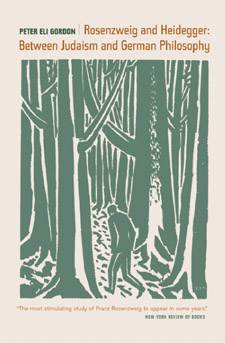 | Title: Rosenzweig and Heidegger: between Judaism and German philosophy Author: Gordon, Peter Eli Published: University of California Press, 2003 Subjects: History | German Studies | Religion | Judaism | European History | Intellectual History | Jewish Studies | Social and Political Thought Publisher's Description: Franz Rosenzweig (1886-1929) is widely regarded today as one of the most original and intellectually challenging figures within the so-called renaissance of German-Jewish thought in the Weimar period. The architect of a unique kind of existential theology, and an important influence upon such philosophers as Walter Benjamin, Martin Buber, Leo Strauss, and Emmanuel Levinas, Rosenzweig is remembered chiefly as a "Jewish thinker," often to the neglect of his broader philosophical concerns. Cutting across the artificial divide that the traumatic memory of National Socialism has drawn between German and Jewish philosophy, this book seeks to restore Rosenzweig's thought to the German philosophical horizon in which it first took shape. It is the first English-language study to explore Rosenzweig's enduring debt to Hegel's political theory, neo-Kantianism, and life-philosophy; the book also provides a new, systematic reading of Rosenzweig's major work, The Star of Redemption. Most of all, the book sets out to explore a surprising but deep affinity between Rosenzweig's thought and that of his contemporary, the German philosopher Martin Heidegger. Resisting both apologetics and condemnation, Gordon suggests that Heidegger's engagement with Nazism should not obscure the profound and intellectually compelling bond in the once-shared tradition of modern German and Jewish thought. A remarkably lucid discussion of two notably difficult thinkers, this book represents an eloquent attempt to bridge the forced distinction between modern Jewish thought and the history of modern German philosophy - and to show that such a distinction cannot be sustained without doing violence to both. [brief] Similar Items |
| 7. | 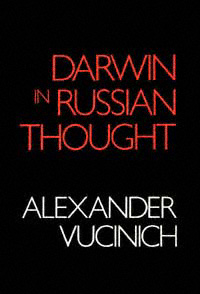 | Title: Darwin in Russian thought Author: Vucinich, Alexander 1914- Published: University of California Press, 1989 Subjects: Science | History and Philosophy of Science Publisher's Description: Darwin in Russian Thought represents the first comprehensive and systematic study of Charles Darwin's influence on Russian thought from the early 1860s to the October Revolution. While concentrating on the role of Darwin's theory in the development of Russian science and philosophy, Vucinich also explores the dominant ideological and sociological interpretations of evolutionary thought, providing a deft analysis of the views held by the leaders of Russian nihilism, populism, anarchism, and marxism.Darwin's thinking profoundly influenced intellectual discourse in Russia: it effected the emergence of "theoretical theology," a modern effort to provide theological responses to the revolutionary changes in the natural sciences, contributed to the evolution of a modern scientific community, and spurred the rapidly growing concern with the epistemological and ethical foundations of science in general. Scholarly battles were waged among the critics of Darwin - Karl von Baer, Nikolai Iakovlevich Danilevskii and Sergei Ivanovich Korzhinskii, and others - and the defenders of the faith.Vucinich is able to delineate the distinctive national characteristics of Russian Darwinism: the strong influence of Lamarckian thought, the delayed recognition of the contributions of genetics, the near-universal rejection of Social Darwinism, the early anticipation of the triumph of "evolutionary synthesis," and the heavy concentration on the social and moral aspects of evolutionary thought. Vividly argued and rich in detail, Darwin in Russian Thought provides a unique glimpse into the Russian psyche. [brief] Similar Items |
| 8. | 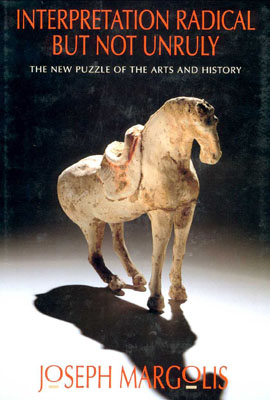 | Title: Interpretation radical but not unruly: the new puzzle of the arts and history Author: Margolis, Joseph 1924- Published: University of California Press, 1995 Subjects: Philosophy | Social and Political Thought Publisher's Description: With this challenging work, Joseph Margolis continues the project begun in The Flux of History and the Flux of Science (California, 1993). Tackling one of philosophy's master themes, he develops the controversial thesis that the world is a flux. Here he applies this doctrine to Western theories of history and the interpretation of cultural phenomena - offering the first sustained analysis of the logic, methodology, and metaphysics of interpretation committed to a thoroughgoing relativism and the historicized structure of cultural phenomena. Versed in Anglo-American and Continental philosophy, Margolis draws on the best views of Western philosophy to investigate a topic regularly ignored in that tradition. The result is the surprising synthesis of two historically antipathetic approaches to philosophy. [brief] Similar Items |
| 9. | 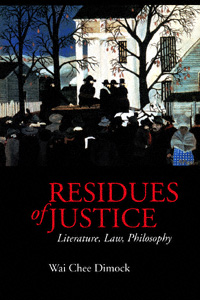 | Title: Residues of justice: literature, law, philosophy Author: Dimock, Wai-chee 1953- Published: University of California Press, 1996 Subjects: Literature | Literary Theory and Criticism | American Studies | Law | Philosophy Publisher's Description: In this arresting book, Wai Chee Dimock takes on the philosophical tradition from Kant to Rawls, challenging its conception of justice as foundational, self-evident, and all-encompassing. The idea of justice is based on the premise that the world can be resolved into commensurate terms: punishment equal to the crime, redress equal to the injury, benefit equal to the desert. Dimock focuses, however, on what remains unexhausted, unrecovered, and noncorresponding in the exercise of justice. To honor these "residues," she turns to literature, which, in its linguistic density, transposes the clean abstractions of law and philosophy into persistent shadows, the abiding presence of the incommensurate. Justice can only be a partial answer to the phenomenon of human conflict.In arguing for justice as an incomplete virtue, Dimock draws upon legal history, political philosophy, linguistics, theology, and feminist theory; she discusses Aristotle and Augustine, Locke and Luther, Marx and Durkheim, Michael Sandel and Carol Gilligan, Noam Chomsky and Mary Ann Glendon. She also examines an unusual configuration of nineteenth-century American authors, pairing figures such as Herman Melville and Rebecca Harding Davis, Walt Whitman and Susan Warner.The result is a book both passionate and scholarly. It invites us to rethink the meanings of literature, law, and philosophy, and to imagine a language of community more supple and more nuanced than the language of justice. [brief] Similar Items |
| 10. | 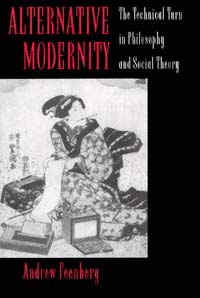 | Title: Alternative modernity: the technical turn in philosophy and social theory Author: Feenberg, Andrew Published: University of California Press, 1995 Subjects: Philosophy | Social and Political Thought | History and Philosophy of Science | Popular Culture Publisher's Description: In this new collection of essays, Andrew Feenberg argues that conflicts over the design and organization of the technical systems that structure our society shape deep choices for the future. A pioneer in the philosophy of technology, Feenberg demonstrates the continuing vitality of the critical theory of the Frankfurt School. He calls into question the anti-technological stance commonly associated with its theoretical legacy and argues that technology contains potentialities that could be developed as the basis for an alternative form of modern society.Feenberg's critical reflections on the ideas of Jürgen Habermas, Herbert Marcuse, Jean-François Lyotard, and Kitaro Nishida shed new light on the philosophical study of technology and modernity. He contests the prevalent conception of technology as an unstoppable force responsive only to its own internal dynamic and politicizes the discussion of its social and cultural construction.This argument is substantiated in a series of compelling and well-grounded case studies. Through his exploration of science fiction and film, AIDS research, the French experience with the "information superhighway," and the Japanese reception of Western values, he demonstrates how technology, when subjected to public pressure and debate, can incorporate ethical and aesthetic values. [brief] Similar Items |
| 11. | 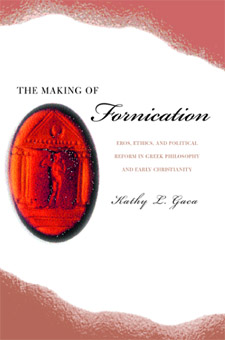 | Title: The making of fornication: eros, ethics, and political reform in Greek philosophy and early Christianity Author: Gaca, Kathy L Published: University of California Press, 2003 Subjects: Classics | Classical Philosophy | Classical Religions | Classical Politics | Christianity | Ethics | Social and Political Thought | Ancient History | Intellectual History Publisher's Description: This provocative work provides a radical reassessment of the emergence and nature of Christian sexual morality, the dominant moral paradigm in Western society since late antiquity. While many scholars, including Michel Foucault, have found the basis of early Christian sexual restrictions in Greek ethics and political philosophy, Kathy L. Gaca demonstrates on compelling new grounds that it is misguided to regard Greek ethics and political theory - with their proposed reforms of eroticism, the family, and civic order - as the foundation of Christian sexual austerity. Rather, in this thoroughly informed and wide-ranging study, Gaca shows that early Christian goals to eradicate fornication were derived from the sexual rules and poetic norms of the Septuagint, or Greek Bible, and that early Christian writers adapted these rules and norms in ways that reveal fascinating insights into the distinctive and largely non-philosophical character of Christian sexual morality. Writing with an authoritative command of both Greek philosophy and early Christian writings, Gaca investigates Plato, the Stoics, the Pythagoreans, Philo of Alexandria, the apostle Paul, and the patristic Christians Clement of Alexandria, Tatian, and Epiphanes, freshly elucidating their ideas on sexual reform with precision, depth, and originality. Early Christian writers, she demonstrates, transformed all that they borrowed from Greek ethics and political philosophy to launch innovative programs against fornication that were inimical to Greek cultural mores, popular and philosophical alike. The Septuagint's mandate to worship the Lord alone among all gods led to a Christian program to revolutionize Gentile sexual practices, only for early Christians to find this virtually impossible to carry out without going to extremes of sexual renunciation. Knowledgeable and wide-ranging, this work of intellectual history and ethics cogently demonstrates why early Christian sexual restrictions took such repressive ascetic forms, and casts sobering light on what Christian sexual morality has meant for religious pluralism in Western culture, especially among women as its bearers. [brief] Similar Items |
| 12. | 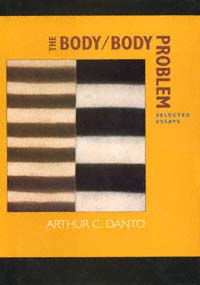 | Title: The body/body problem: selected essays Author: Danto, Arthur Coleman 1924- Published: University of California Press, 1999 Subjects: Philosophy | Art Criticism | Social and Political Thought Publisher's Description: The overall subject of the essays in The Body/Body Problem is the traditional one of what our ultimate makeup is, as creatures with minds and bodies. The central thesis is that we are beings who represent - and misrepresent - actual and possible worlds. Addressing philosophical questions of mental representation, Danto presents his distinctive approach to some of the most enduring topics in philosophy. He is concerned with the nature of description, the status of the external world, action theory, the philosophy of history, and the philosophical status of psychoanalytic explanation. Representation is a central concept in philosophy, says Danto, with differences among philosophers arising in the ways they account for how representations connect to the world or to the individuals possessing them, and how they connect with one another to form systems of beliefs, feelings, and attitudes. In these essays Danto's own voice, with his arguments and speculations, provides rich philosophical pleasures that will endure, to borrow from Santayana, "under whatever sky."Arthur C. Danto is one of the most original and multitalented philosophers writing today, a thinker whose interests traverse the boundaries of traditional understandings of philosophy. Best known for his contributions to the philosophy of art and aesthetics, Danto is also esteemed for his work in the history of philosophy, the philosophy of history, philosophical psychology, and action theory. These two volumes, each with an introduction by the author, contain essays spanning more than twenty-five years that have been selected to highlight the inseparability of philosophy and art in Danto's work. Together they present the thinking of Arthur C. Danto at his very best. [brief] Similar Items |
| 13. | 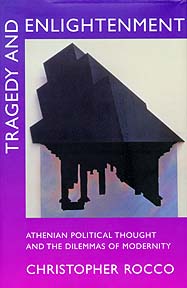 | Title: Tragedy and enlightenment: Athenian political thought, and the dilemmas of modernity Author: Rocco, Christopher 1958- Published: University of California Press, 1997 Subjects: Classics | Classical Philosophy | Classical History | Classical Literature and Language | Social and Political Thought | Social Theory Publisher's Description: Weaving together ancient Greek texts and postmodernist theory, Christopher Rocco addresses the debate between modernity and postmodernity that dominates contemporary theory. Interpreting Greek drama within a critical framework informed by contemporary theorists Foucault, Habermas, Horkheimer and Adorno, Tragedy and Enlightenment makes a sophisticated argument for the continuing relevance of the classical past, focusing on the subject of democracy.The starting point for Rocco's analysis is the impasse in contemporary political and cultural theory over the possibility and desirability of democracy in a postmodern world. After explaining the competing positions in the current debate, Rocco argues that ancient Greek tragedy and dialogue - specifically Sophocles' Oedipus , Plato's Republic and Gorgias , and Aeschylus' Oresteia - suggest alternate constructions for this and other postmodern problems.Rocco gives a detailed analysis of the contemporary divide over the theories of Jürgen Habermas and Michel Foucault and provides a provocative reading of Horkheimer and Adorno's Dialectic of Enlightenment. This original contribution to political and cultural discourse brings us to a new understanding of familiar texts and will alter the grounds of debate for students and scholars of the classical and the contemporary worlds. [brief] Similar Items |
| 14. | 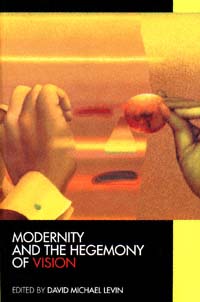 | Title: Modernity and the hegemony of vision Author: Levin, David Michael 1939- Published: University of California Press, 1993 Subjects: Philosophy | Literature | Ethics Publisher's Description: This collection of original essays by preeminent interpreters of continental philosophy explores the question of whether Western thought and culture have been dominated by a vision-centered paradigm of knowledge, ethics, and power. It focuses on the character of vision in modern philosophy and on arguments for and against the view that contemporary life and thought are distinctively "ocularcentric." The authors examine these ideas in the context of the history of philosophy and consider the character of visual discourse in the writings of Plato, Descartes, Hegel, Nietzsche, Husserl, Heidegger, Benjamin, Sartre, Merleau-Ponty, Levinas, Derrida, Foucault, Gadamer, Wittgenstein, and Habermas. With essays on television, the visual arts, and feminism, the book will interest readers in cultural studies, gender studies, and art history as well as philosophers. [brief] Similar Items |
| 15. | 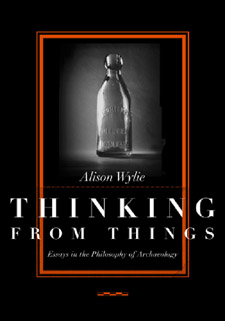 | Title: Thinking from things: essays in the philosophy of archaeology Author: Wylie, Alison Published: University of California Press, 2002 Subjects: Philosophy | Archaeology | History of Science Publisher's Description: In this long-awaited compendium of new and newly revised essays, Alison Wylie explores how archaeologists know what they know. Examining the history and methodology of Anglo-American archaeology, Wylie puts the tumultuous debates of the last thirty years in historical and philosophical perspective. Similar Items |
| 16. | 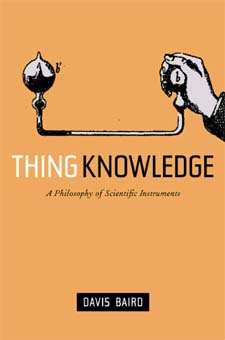 | Title: Thing knowledge: a philosophy of scientific instruments Author: Baird, Davis Published: University of California Press, 2004 Subjects: Philosophy | Technology and Society Publisher's Description: Western philosophers have traditionally concentrated on theory as the means for expressing knowledge about a variety of phenomena. This absorbing book challenges this fundamental notion by showing how objects themselves, specifically scientific instruments, can express knowledge. As he considers numerous intriguing examples, Davis Baird gives us the tools to "read" the material products of science and technology and to understand their place in culture. Making a provocative and original challenge to our conception of knowledge itself, Thing Knowledge demands that we take a new look at theories of science and technology, knowledge, progress, and change. Baird considers a wide range of instruments, including Faraday's first electric motor, eighteenth-century mechanical models of the solar system, the cyclotron, various instruments developed by analytical chemists between 1930 and 1960, spectrometers, and more. [brief] Similar Items |
| 17. | 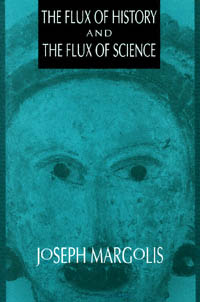 | Title: The flux of history and the flux of science Author: Margolis, Joseph 1924- Published: University of California Press, 1993 Subjects: Philosophy | History and Philosophy of Science Publisher's Description: Does thinking have a history? If there are no necessarily changeless structures to be found in things and in our inquiry into them, then what knowledge of the world and ourselves is possible? In this boldly original and elegantly written study, Joseph Margolis argues for a radically historicized view of history that treats it as both a real process and a narrative account, each a product of continual change. Developing his argument through discussions of such influential philosophers of history and the natural sciences as Vico, Danto, Collingwood, Habermas, Hempel, Popper, Putnam, and Gadamer, he provides a coherent theory of flux and invariance that resolves several deep puzzles regarding human nature and understanding.While maintaining a thorough command of Anglo-American philosophy, Margolis challenges many of its most cherished assumptions and demonstrates the sense in which history and interpretation are one and the same. Exploring one of the master themes of this century, his book offers a novel theory of the human condition whose conclusions and concerns seem certain to inform philosophy in the next century as well. [brief] Similar Items |
| 18. | 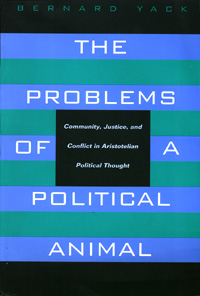 | Title: The problems of a political animal: community, justice, and conflict in Aristotelian political thought Author: Yack, Bernard 1952- Published: University of California Press, 1993 Subjects: Politics | Philosophy | Political Theory | Social and Political Thought | Social Theory Publisher's Description: A bold new interpretation of Aristotelian thought is central to Bernard Yack's provocative new book. He shows that for Aristotle, community is a conflict-ridden fact of everyday life, as well as an ideal of social harmony and integration. From political justice and the rule of law to class struggle and moral conflict, Yack maintains that Aristotle intended to explain the conditions of everyday political life, not just, as most commentators assume, to represent the hypothetical achievements of an idealistic "best regime."By showing how Aristotelian ideas can provide new insight into our own political life, Yack makes a valuable contribution to contemporary discourse and debate. His work will excite interest among a wide range of social, moral, and political theorists. [brief] Similar Items |
| 19. | 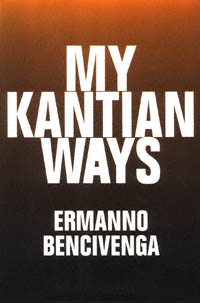 | Title: My Kantian ways Author: Bencivenga, Ermanno 1950- Published: University of California Press, 1995 Subjects: Philosophy | Social and Political Thought Publisher's Description: In My Kantian Ways , Ermanno Bencivenga, one of the most creative and iconoclastic practitioners of American philosophy, sets out to explore Kant's legacy for contemporary thought. Seeking to extricate the German philosopher's work from the stranglehold of the prevailing analytic tradition, he presents his own defamiliarizing and unique interpretation of Kantianism. Kant emerges as a master thinker whose emphasis on judgment provides the basis for a new approach to the practice of philosophy as a vehicle for learning. Ranging from speculations on the electronic self to a tour-de-force critique of the postmodern thought of Richard Rorty, Bencivenga's book is an inviting blend of styles and genres. Plucky, irritating, and sometimes wickedly funny, My Kantian Ways calls attention to the frequent mediocrity and false piety of much of today's professional philosophy. Through these intensely personal essays, Bencivenga reminds us just how much philosophy can matter. [brief] Similar Items |
| 20. | 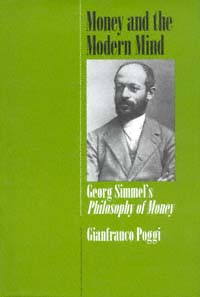 | Title: Money and the modern mind: George Simmel's Philosophy of money Author: Poggi, Gianfranco Published: University of California Press, 1993 Subjects: Social Science | Philosophy | Economics and Business | Social Theory | European Studies Publisher's Description: A major representative of the German sociological tradition, Georg Simmel (1858-1918) has influenced social thinkers ranging from the Chicago School to Walter Benjamin. His magnum opus, The Philosophy of Money , published in 1900, is nevertheless a difficult book that has daunted many would-be readers. Gianfranco Poggi makes this important work accessible to a broader range of scholars and students, offering a compact and systematically organized presentation of its main arguments.Simmel's insights about money are as valid today as they were a hundred years ago. Poggi provides a sort of reader's manual to Simmel's work, deepening the reader's understanding of money while at the same time offering a new appreciation of the originality of Simmel's social theory. [brief] Similar Items |